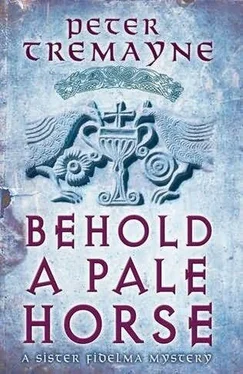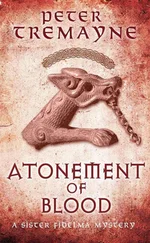Peter Tremayne - Behold a Pale Horse
Здесь есть возможность читать онлайн «Peter Tremayne - Behold a Pale Horse» весь текст электронной книги совершенно бесплатно (целиком полную версию без сокращений). В некоторых случаях можно слушать аудио, скачать через торрент в формате fb2 и присутствует краткое содержание. Год выпуска: 2012, Издательство: St. Martin, Жанр: Исторический детектив, на английском языке. Описание произведения, (предисловие) а так же отзывы посетителей доступны на портале библиотеки ЛибКат.
- Название:Behold a Pale Horse
- Автор:
- Издательство:St. Martin
- Жанр:
- Год:2012
- ISBN:нет данных
- Рейтинг книги:5 / 5. Голосов: 1
-
Избранное:Добавить в избранное
- Отзывы:
-
Ваша оценка:
- 100
- 1
- 2
- 3
- 4
- 5
Behold a Pale Horse: краткое содержание, описание и аннотация
Предлагаем к чтению аннотацию, описание, краткое содержание или предисловие (зависит от того, что написал сам автор книги «Behold a Pale Horse»). Если вы не нашли необходимую информацию о книге — напишите в комментариях, мы постараемся отыскать её.
Behold a Pale Horse — читать онлайн бесплатно полную книгу (весь текст) целиком
Ниже представлен текст книги, разбитый по страницам. Система сохранения места последней прочитанной страницы, позволяет с удобством читать онлайн бесплатно книгу «Behold a Pale Horse», без необходимости каждый раз заново искать на чём Вы остановились. Поставьте закладку, и сможете в любой момент перейти на страницу, на которой закончили чтение.
Интервал:
Закладка:
‘Is it safe?’ she found herself wondering aloud.
Magister Ado chuckled. ‘It is called the Devil’s Bridge,’ he replied. ‘There is a story that Columbanus was trying to construct a stone bridge when the Devil appeared to him. He offered to build the bridge in a single night, but on one condition: that the first living soul to cross the bridge was to be his. Columbanus agreed. The bridge was built by morning, but because of the indiscipline of the imps and goblins that the Devil employed, each section came out in that series of humps you see and not one long level stretch.’
‘And did the Devil claim his soul?’ Fidelma asked sceptically.
‘It is said that Columbanus persuaded a little dog to run across the bridge and thus the Devil had to be satisfied with it rather than take a Christian soul which he had desired.’
Fidelma thought for a moment. ‘The story is hard to believe. In the first place, how could such a saintly man as Colm Bán make a pact with the Devil to achieve such a mundane taskas building a bridge? In the second place, he would not mistreat a poor, innocent animal so callously. And finally, in the third place, why would the Devil take the soul of a dog when the Faith teaches us that only man is possessed of a soul but animals are not?’
Magister Ado was smiling broadly. ‘You are truly of a sceptical and practical mind, Fidelma. I perceive that this must not only be because of your land of origin, but also your training in law? Well, perhaps you will be pleased to know that our scholars tell us that the bridge was first built by the Roman legions when they were conquering this land. So, in spite of local tales, the bridge was here before Columbanus. Therefore, I think it will be safe enough to cross, Devil or no Devil.’
The stone bridge was narrow, scarcely wide enough for two riding abreast, but the party crossed and found themselves on the lower slopes of the mountain which apparently rose in easy stages. Fidelma could no longer see the peak, which seemed to merge with the surrounding hills. The abbey, with its redbrick tiles and soft ochre stucco walls, dominated the area a little way up the hillside. Near it were various buildings, constituting a small township. Around the settlement were arable lands that had been cultivated for agricultural purposes. As they moved up the track closer to the abbey, Fidelma saw that its main buildings were enclosed by high walls from which some of the stuccowork had fallen, revealing blocks of stone. On the walls, near the gates, rose a bell-tower. Someone had observed their approach, and a slow regular chime of the bell sounded, ceasing after the fourth ring. The gates were tall, fitted in the walls, and seemed of a dark wood. She would have guessed they were made of oak. They were swinging open.
The company had reached a point before the gates where the track divided, and here the warriors turned aside after a brief conversation with Magister Ado and a salute of farewell. They moved off towards the township, where the farmers and their pack mules were already heading. Magister Ado led the way up the short incline through the open gates. As they entered, one of the brethren approached with a look of astonishment on his features as he recognised Magister Ado.
‘Magister Ado! Is it truly you?’
‘If not I then it is my shadow,’ replied the elderly religieux, dismounting from his horse. ‘Indeed, Brother Wulfila, I have returned from my journey.’
‘The abbot shall be informed of your safe coming at once.’ His eyes alighted on Brother Faro, then widened in horror. ‘But you are hurt, my-’
‘It is nothing,’ Brother Faro almost snapped at him. Then, aware of his bad manners towards the steward, he dismounted and turned in more conciliatory manner. ‘Forgive me, Brother Wulfila. A slight pain has caused me a distemper. Mea culpa .’
Brother Wulfila dismissed the apology quickly. ‘You must see the apothecary at once.’
‘I can take him there,’ offered Sister Gisa. ‘We have already dressed and bound the wound, but it needs to be checked.’
Brother Wulfila hesitated. ‘You cannot wander the abbey without permission of the abbot. I am told to be strict about the Rule that demands the segregation of the sexes.’ He motioned to the man who had opened the gates for them. ‘Brother Bladulf, take Brother Faro to the apothecary, for he is in need of attention. ’ Then he turned anxiously back to Magister Ado. ‘A fall from his horse?’
Magister Ado shook his head. ‘An arrow from a bandit, I’m afraid.’ Brother Wulfila continued to look worried andwas about to press for more information when Magister Ado presented Fidelma. ‘Sister Fidelma, this is Brother Wulfila, the steward of the abbey. Sister Fidelma’s old mentor is Brother Ruadán and it is to see him that she has come especially to our abbey.’
At once, Brother Wulfila’s features grew solemn. ‘Then I am afraid, Sister Fidelma, that you have arrived only just in time. Poor Brother Ruadán started ailing a week or so ago and now he is not expected to be long in this world. His mind is already wandering.’
‘Yet he still lives?’ she asked anxiously.
‘He was severely beaten and lucky to escape with his life. Age hinders his recovery. Alas, we are told it is merely a matter of time.’
‘Then I would see him at once.’
Brother Wulfila looked scandalised. ‘This is not a conhospitae , Sister. Women are only allowed in here with the abbot’s special dispensation. That is why I could not allow Sister Gisa to accompany Brother Faro to the apothecary. The women’s house is in the township. Women are only allowed within the abbey walls to attend the chapel and share services and to join us in the main evening meal before prayers.’
Magister Ado patted Brother Wulfila on the arm. ‘Then first we must make our presence known to the abbot,’ he insisted gently. ‘It is etiquette. And Fidelma is not just any visitor, she comes from Rome and is the daughter of a king of Hibernia.’
Fidelma had to contain her impatience at the delay in seeing Brother Ruadán because she knew that Magister Ado was correct. It would be bad manners to go against established convention and disrespect the rules of the abbey.
‘I will take you to him,’ the steward said, before turning to Sister Gisa and adding brusquely: ‘There is no need for you to remain.’
For a moment, Sister Gisa looked unwilling to be thus dismissed. Then she said pointedly to Fidelma, ‘I will see you at the evening meal, if not before.’ Then, taking the horse that Radoald had given her, she rode back through the abbey gates. Brother Wulfila had signalled to two more of the brethren who came forward, one to take charge of their horses and pack mule while the other brought a bucket, a ladle and a cloth. Fidelma had almost forgotten the ritual of washing newcomers’ hands and feet on the entering of an abbey for the first time.
Brother Wulfila then led them across the large stoneflagged courtyard towards the main doors. The news of the arrival of Magister Ado, who apparently had distinction in the abbey, had spread rapidly so that many of the brethren had started to spill into the courtyard to greet him. At the top of a short flight of steps which led to the main doors, stood a tall, swarthy man of the same years as Magister Ado. But he was thin with dark hair and eyes. His jowls showed the blue-black of a beard that would need shaving twice daily, had he allowed it to grow. His features were not unpleasant and he wore the symbols that proclaimed him as Abbot. As Magister Ado approached, with Fidelma at his shoulder, the abbot came down the steps. There was an expression on his face which Fidelma could not quite interpret. Then he symbolically embraced the magister .
Читать дальшеИнтервал:
Закладка:
Похожие книги на «Behold a Pale Horse»
Представляем Вашему вниманию похожие книги на «Behold a Pale Horse» списком для выбора. Мы отобрали схожую по названию и смыслу литературу в надежде предоставить читателям больше вариантов отыскать новые, интересные, ещё непрочитанные произведения.
Обсуждение, отзывы о книге «Behold a Pale Horse» и просто собственные мнения читателей. Оставьте ваши комментарии, напишите, что Вы думаете о произведении, его смысле или главных героях. Укажите что конкретно понравилось, а что нет, и почему Вы так считаете.










